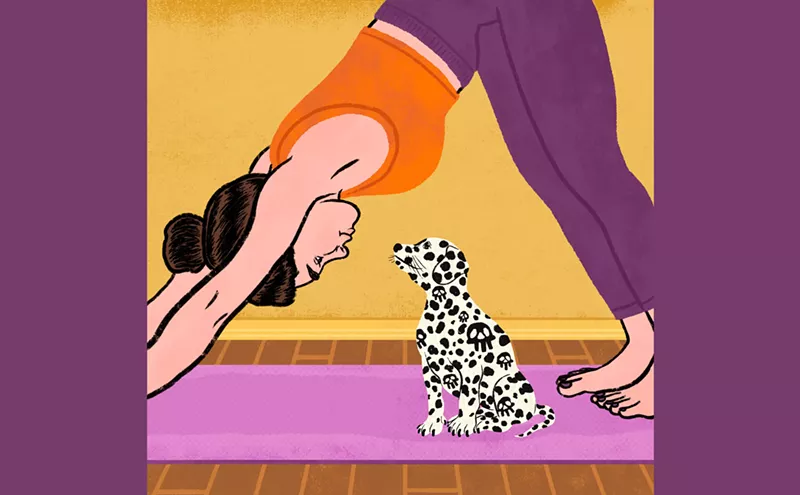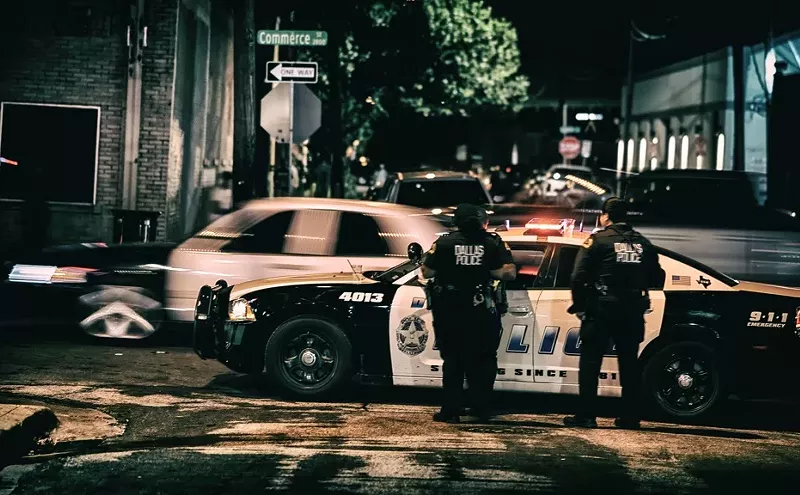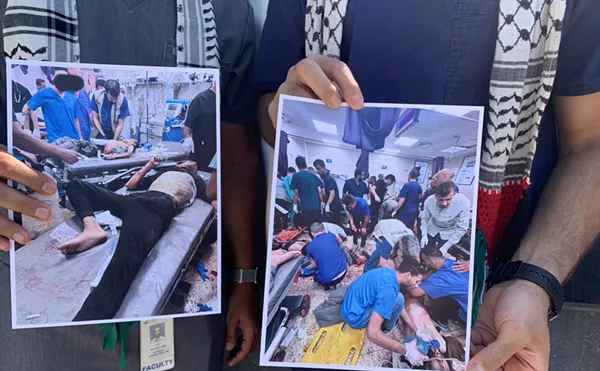Or maybe he's there for himself, writing the novel we all believe we have living within us, doing what every guy who buys a laptop imagines doing with his portable computer--making his escape, one Microsoft Word page at a time, from the humdrum blah-blah-blah. Maybe he's there tuning out the ruckus of caffeinated commerce, dropping into the zone like a pitcher on the mound as he writes, writes, writes till the cup goes dry and he calls it a day till tomorrow, and the next day and next, till he finishes that book, it goes in a drawer and he goes on with his life.
Or maybe he does something with the book--takes it to an agent, shops it around and dreams of instant-winning the literary lottery. Maybe the book'll get rejected, and he'll self-publish. Maybe a few will sell on his Web site or even Amazon. And then, what the hell, maybe it'll attract the interest of a screenwriter, who might just take it to an Academy Award-winning producer. And, screw it, since we're really dreaming, maybe a major motion picture studio and a major New York publishing house will buy the book within weeks of each other.
It could happen. Did to Will Clarke.
If you don't know his name, that's because you don't hang out at the Starbucks in Lakewood or at Mysteries & More bookstore on Abrams Parkway or at nearby Legal Grounds, where they used to sell copies of his wacky-brilliant-spiritual-set-in-Dallas-what-the-fuck "spy novel" Lord Vishnu's Love Handles, which Clarke self-published in 2002. Or maybe it's because you don't hang out at Borders Books and Music or Barnes & Noble, where, last month, Simon & Schuster shipped copies of Lord Vishnu's Love Handles after paying the dude Manhattan money for being a brilliant writer. Or perhaps you don't read the Hollywood trade magazine Variety, which announced in July 2004 that Lord Vishnu's Love Handles will be made into a movie by Paramount Pictures, produced by Sideways' Michael London and directed by acclaimed indie visionary David Gordon Green.
It wasn't so long ago Clarke was just an advertising man, selling stuff for other people--Hershey's Milk, Texas Instruments, Folger's. It wasn't the job he was considering when he left Louisiana State University in 1993, just the one he took when he couldn't get any other work. But he's good at selling, one of those hotshots who goes to work for Larry Tate then takes the boss' job before he's 40. Or would have, had he not gone and sold his novel to one of the world's biggest publishers.
Now, as he finds himself at the beginning of a book tour with an indefinite end date and waiting for the cameras to begin rolling, Will Clarke is out there selling himself. He's a product now--a brilliant writer, too, but also a product, with all the makings of a franchise.
"It's a nice success story," says London, with the understatement of a pragmatist who knows something of nice success stories himself. After all, London disproved the movie studio suits who told him he wouldn't make a dime with a movie starring Thomas Haden Church and Paul Giamatti, long before Alexander Payne's Sideways pocketed some $70 million in U.S. theaters alone. "I feel very confident about this one, as much as I did about Sideways."
Lord Vishnu's Love Handles is actually Clarke's second book, written when his Dallas agent could find no taker for his first, The Worthy, about a dead frat boy at LSU who haunts his killer. Clarke began writing Lord Vishnu in late 1999, when he was creating award-winning ads for the firm McCann-Erickson, and completed it in 2001. It's no easy thing to describe. Everyone you ask about it says the same thing--"It's the most original thing I've read in years"--but then offers his or her own interpretation of what makes it so special.
To put it glibly, it's about a shallow, golf-loving, booze-swilling Lakewood dot-commer named Travis Anderson who is cursed with being able to read and influence minds even as he loses his. It's Kurt Vonnegut by way of Alfred Hitchcock, a screwy comic thriller involving CIA agents, vacuous Lakewood dinner parties, wives who cheat with their spouse's business partners, albino wannabe vampires who could either be brother and sister or lovers, an apocalypse that threatens to destroy Disney World and a holy man who believes himself "death, shatterer of worlds." It's as though Alfred E. Neuman has rewritten the Bhagavad-Gita in his own gap-toothed image, this work of anarchic satire that's as much about the inability of the thirtysomething man to grow up as it is about his spiritual salvation. And it takes many wonderful digs at the city in which Clarke's lived and worked for nearly 13 years; it's no chamber of commerce giveaway, despite the writer's affection for Dallas.
On a steamy Sunday afternoon, Clarke, who turns 36 this month, sits in the very Lakewood area Starbucks where he wrote much of Lord Vishnu's Love Handles. The place is awash in noise--blender, cappuccino machine and chatting customers forming what feels like an impenetrable wall of sound.
"I like to have noise," Clarke says. "I like to have all this stuff going on around me...I got used to the nervousness of being around people. Trying to get it done quickly kind of fueled me. And the noise almost anesthetizes the part of my brain that's over-thinking things."
Today, though, he doesn't have his laptop with him. It has been replaced by his T-Mobile Sidekick, on which he takes phone calls, posts to his blog (www.booktourvirgin.com) and responds to e-mails from his editor at Simon & Schuster in New York or his agents (one for books, one for movies) or the screenwriter and director and producer trying to make Lord Vishnu for the big screen. At the moment, there is little time for writing a new book, not when the old one needs so much attention.
It was exactly one year ago, in August 2004, that Clarke signed the papers with Simon & Schuster. At almost the same time the deal with Paramount was sealed. By then, he had resigned himself to a fate of self-publishing and selling his books through his own publishing company, MiddleFinger Press, which Clarke facetiously billed as "an imprint of the Freakishly Big Feet and Hands Media Empire." For years, no one would touch him. And then, in an instant, everyone wanted him.
"It was strange," Clarke says of that period, just 12 months ago. "It was a really exciting time. It was really cool."
That sounds awfully understated.
He grins.
"Yeah, well, I don't know how else to describe it," he says. "I would call my girlfriend, Michelle, and say, 'Guess what just happened today?' It was such out-of-the-blue, weird, extraordinary news that she would literally react to it with shock, like you were delivering all this bad news. She was like, 'Back up and start over, because this doesn't make any sense to me. What are you saying? I'm not processing this at all.' So I have to start way back at the beginning of Genesis and explain it to her, because it was such impossible news. Yeah, it was great. It was cool. It was a dream come true."
Behind Clarke, at this very moment, a guy is tap-tap-tapping away at his laptop, drinking his coffee, very likely writing his novel and dreaming of becoming the next Will Clarke. Even if he doesn't know it yet.
"Gone are the days when self-publishing was virtually synonymous with self-defeating."
--Former Publishers Weekly columnist Paul Nathan
On the Web site www.selfpublishinghalloffame.com, there is a list of more than 100 writers who published their own books when New York houses refused even to glance at their manuscripts. Some are well-known, most are modestly famous, a few are even superstars in houses without book shelves. There's Stewart Brand, whose The Whole Earth Catalog would become a perennial New York Times bestseller, as would the South Beach Diet books of Arthur Agaston, who was printing pamphlets before he began printing money. Amanda Brown could find no takers for her novel Legally Blonde, which eventually spawned two movies. The Prince of Tides author Pat Conroy had to publish his first book, as did the likes of L. Ron Hubbard, Ernest Hemingway, Deepak Chopra, Louis L'Amour and Waiting to Exhale's Terry McMillan. There is no shame in self-publishing. No money, either. But, still.
When Clarke began writing The Worthy in the mid-1990s, the notion of self-publishing never crossed his mind. He began his first novel because, far as he was concerned, he had no other choice. He'd just been fired from an ad agency, Joiner Rowland Serio, where he'd worked for six months. Turns out they didn't think he could write. So, naturally, he began writing a novel.
Fact is, back then the folks at Joiner Rowland Serio were probably right. Clarke didn't know the first thing about writing ad copy. Didn't study advertising at LSU--didn't study much, actually, except how to be a good ol' frat boy. Not that Clarke was primo fraternity material: His mom's pretty religious; his father has Parkinson's; and Clarke spent most of his childhood, all the way through high school, secretly writing and illustrating his own books, which he never showed to anybody because he figured it was "so not cool making these dorky books for myself all the time." In college, Clarke and his buddies used to get drunk and make prank phone calls that became long, involved narratives.
"Like, we would call Jimmy Swaggart's church and try to get the people to tell us exactly what Jimmy Swaggart did with a prostitute in a limo, 'cause we need to pray for his forgiveness so we can continue to give money," he recalls. "But we needed to know exactly what it was. These kind of ridiculous things. I just kind of moved that childhood storytelling into a more frat-boy-appropriate place."
He moved to Dallas from his hometown of Shreveport in 1993 because it was a nearby big city and because his brother lived here, selling commercial real estate. All his friends from school were getting decent jobs, but Clarke had no idea what to do. He recalled reading some book about how left-handed people were more creative than their right-handed brethren and thought, well, he'd do something creative...like...uh... advertising, yeah, that's it.
"So I went to Half-Price Books and got a book that was written in 1960 about advertising, which is basically, you get a black marker and draw these fake ads," Clarke says. "I made a bunch of dumb fake ads with really stupid puns that I thought were funny and tried to get a job in advertising. And it didn't work. I went to an interview with the Richards Group, and I didn't know what a copywriter was, but I'm like, 'I'm really creative and I'm left-handed and there's this whole book I read about left-handed people and they're creative and blah blah blah.' And I had this whole spiel, this really cockamamie spiel about left-handed people. And the guy was like, 'It sounds like you should be a copywriter.' I'm like 'Dude, I'll make copies. I'll do whatever you need me to do, just get my foot in the door! I'm so there!' He didn't call me back for a second interview."
It got to the point where Clarke was so desperate to get his foot in the door he would, quite literally and quite often, fax a photo of his foot to the office. He wound up getting a gig as an assistant manager at the AMC Prestonwood movie theater, which is what happens when you spend most of college making prank phone calls while very, very drunk.
He would eventually get a job at a small agency working rent-to-own and car dealer accounts. Clarke wised up and shelled out the bread to take ad classes through East Texas State University. He studied classic ads, made a mock portfolio and became a student of selling. By the mid-'90s he started getting better gigs, then losing them. But, still, he was going the right direction on the ladder of success.
"I love advertising. It's a really great gig," Clarke says, "but I always saw myself as a novelist moonlighting in advertising. And when I got fired from Joiner, I actually came across this megalomaniacal idea that maybe I should be a novelist."
So he enrolled in a creative writing class at Southern Methodist University, where he found himself surrounded by other people who likewise believed their muses were being crushed by sitting in cubicles beneath fluorescent lighting. Clarke learned how to create a narrative, how to write dialogue that actually sounded the way people speak, how to stop over-thinking the story. He fell in with a group that included commercial real estate appraiser Harry Hunsicker (whose noir novel Still River was published in May by St. Martin's), Doris Elaine Sauter (co-editor of What if Our World is Their Heaven, a collection of conversations with author Phillip K. Dick) and other aspiring novelists. They eventually formed a Wednesday-night writers' group, which began at Legal Grounds and still exists today.
When Clarke finished The Worthy, he was in his late 20s, sort of broke but also pretty sure he'd sell the book and make a million bucks. That's the way the publishing world works, right? Well, actually...
For years, his local literary agent, the mighty Jan Miller, shopped the book up and down Manhattan Island with no takers. Four years of writing, and then nothing. Fact is, the only reason Clarke even wrote Lord Vishnu's Love Handles was to give Miller something new to shop and something to keep her interested. But it didn't work. She gave up, and Clarke gave up. It could have been worse, actually. He was getting pretty good gigs in advertising by this point--at McCann, then at DDB Worldwide, where he was creative director. Self-publishing didn't seem so bad, even if the name MiddleFinger smelled just a little bitter. At least he'd get to design the book covers.
And so, Will Clarke became a novelist and a publisher and, in August 2002, got his very first book review--in Advertising Age, which called Lord Vishnu's Love Handles "a wild and inventive first novel." Eventually, he'd sell some 2,000 copies through MiddleFinger's Web site, through Amazon and his local hangs. A year later, in September 2003, Advertising Age gave him his second review ever, this time for The Worthy, which MiddleFinger also published. This time, the trade called Clarke "the Dave Eggers of the West," referring to the beloved, self-aggrandizing founder of McSweeney's and the author of A Heartbreaking Work of Staggering Genius. "Actually," Ad Age noted, Clark is "a lot better than Eggers."
Which was nice, but amounted to, oh, about this much of nothing.
But all that changed when he met Simon & Schuster editor Denise Roy at the prestigious, 80-year-old Bread Loaf Writers' Conference, held each summer at Middlebury College in Vermont. Clarke went two years, in 2002 and 2003, and Roy was there both years telling aspiring writers how to get their books published. She was immediately taken with Clarke, not only because he'd self-published Lord Vishnu's Love Handles and The Worthy, but because "he's a very charismatic guy and has a creative vision," she says. Clarke didn't even know she was an editor when they first met, and wasn't even that interested in selling the book. "I had kind of resigned myself to the fact that this book was a really strange book," he says.
Roy asked Clarke to send her Lord Vishnu after the conference, and, like most everyone else who comes in contact with it, adored the thing--so much so, she hooked him with New York agent Jenny Bent, who has quite a few clients who self-published before getting picked up by the big publishing houses.
"It's often the most interesting, the most intelligent, the most quirky books that need to be self-published before New York publishers can see their merits," Bent says. "New York publishing is done by committee. The editor has to like it, then the sales director and the publisher has to like it, and that takes a lot, and if there's something strange or unusual about the book, it's hard to pass through the committee. So it needs to be self-published so it can get a track record and prove itself before New York can go, 'It's successful, now we get it.'"
And it didn't hurt that just as New York was getting interested, so, too, were a few people in Hollywood.
Ultimately, this is as much a story about coincidence as it a tale of tenacity, which seems only appropriate when discussing a book about karma, of which Travis Anderson says toward the end of Lord Vishnu's Love Handles, "I've had enough of that shit to last a couple of lifetimes."
Take Ann Asprodites, a woman from New Orleans Clarke met at a Christmas party in 2003. Asprodites, who represents commercial directors, was in Dallas for a shindig being thrown by the Association of Independent Commercial Producers at the Hall of State in Fair Park when she met Clarke, who was there representing DDB. They got to talking, she mentioned how much she loved to read, he mentioned how he'd written a book, and next thing you know she's online buying a copy of Lord Vishnu. "It's cool to read a book written by somebody you know," she says. "And it turned out to be the most original novel I'd read in a long, long time."
Asprodites was so taken with the novel she gave it to her friend Grant Morris, a New Zealand screenwriter whose credits include The Return of the Swamp Thing and The Shrimp on the Barbie (the latter being so awful the director took his name off it). She wanted to know if he thought it would make a good movie. Morris, too, fell in love with it--"I thought it was extremely funny, original, well-written and clever," he says now--but told Asprodites surely someone's already making it into a movie. Nope, she told him, and gave him Clarke's number, which he dialed immediately to feel out the writer's interest in having his book turned into a screenplay.
"I guess I am to blame for it, happily," Asprodites says. "All this stuff could not have happened to a nicer person than Will. We've become really good friends."
So, he owes you, then?
"Not at all. I'm a firm believer in karma. This was supposed to happen."
To prove he was on the level, Morris sent Clarke an unmade screenplay called Comeback, about an imprisoned country singer stricken with Alzheimer's who's trying to get released before he can no longer perform. Clarke isn't a fan of screenplays--"they read like instructions to a story," he says--but liked Comeback. Still, he says, he kept blowing off Morris, who was not so easily dismissed. Finally, in February 2004, he sold Morris the option to the novel. For a buck.
"Will was crazy enough to trust me with it," Morris says. "We've only spent a number of hours together, but he's a great guy and easy to talk to and extremely intelligent and well-read, a fuckin' academic. He's a smart guy. He knows a lot of stuff. And he was very trusting. He's a very vibe-y guy. He goes on a vibe and got the vibe this would be a good thing and took a chance."
Morris then sent the book to his agent and manager, who began approaching Hollywood producers about turning Lord Vishnu into a film. Several were interested but wanted to know how Morris could turn so rich, dense and complex a narrative into a two-hour movie that could play the mega- mall googolplex. So, each time, Morris would go in and deliver his 35-minute pitch, and more often than not he'd be greeted by the same thing: wide grins and blank stares. They liked it but were also terrified of it.
"You have to be able to break down a complex and wild story like Will's that contains elements of comedy and modern relationships and the Hindu religion and metaphysical underpinnings and turn it into a movie with specific requirements," Morris says of his pitch. "It's like writing a song with a verse and a chorus. A movie has a beginning, middle and end in a specific structure, and you have to demonstrate to people putting up the money you can turn a wild story into something that has a structure as a film. I wanted to show this is a nothing more than the story of an ordinary man in an extraordinary situation."
The one producer who bit, and bit hard, was Michael London, who rarely even listens to pitches from writers. He is, after all, a busy man, having been the producer of such acclaimed films as Thirteen and House of Sand and Fog in 2003 and Sideways, the latter of which was nominated for a Best Motion Picture of the Year Academy Award at the beginning of 2005. London also works with directors who instigate their own projects, which means he seldom needs to troll for new ideas. But this was different. Something about the book got him. And something about Morris kept him there.
"When Grant was sitting there, I remember every beat of the story he was telling just felt completely like nothing I'd seen before and very much like something I could imagine I wanted to see," London says. "And that's rare, almost like once a year, and when it happens it's easy, because you just say, 'I want to do this.'"
As it happened, London was trying to find something to make with director David Gordon Green, acclaimed for his trio of self-described "languid, lyrical dramas" George Washington, All the Real Girls and Undertow. And, as it so happened, Green lived two blocks from Grant Morris, whose script for Comeback had been sent to Green as something he might like to direct. (He passed, Green says, but the director shared the writer's "sensibility and sense of humor.") And, as it so happened, Green's also from Dallas. Did someone say "karma"?
Green read Lord Vishnu and immediately loved it. "I thought, 'This is the funniest crap I've read in a long time,'" he recalls. He told Morris and London he was in, and they started shopping their project around to studios. For Green, the chance to do Lord Vishnu was especially exciting: He's long wanted to make a comedy with mass appeal, to prove he's not merely the maker of moody, humid films.
"I've always seen this as having the absurdity and energy of M*A*S*H and a lot of the present-day commentary and comic sensibility of Groundhog Day," he says. "I want to get into the energy level and not shy away from the odd ridiculousness of the religion and spirituality that are beautifully woven into the story, but ultimately it's a character piece about a pretty funny guy dealing with weird situations thrown in his face."
New Line Cinema was immediately interested, London says. But last summer the trio eventually went to Paramount, where London ended up getting a three-picture deal with the studio, based in no small part on the success of Sideways.
At the same time, Denise Roy was getting antsy to sign Clarke--and, truth be told, the interest from Paramount didn't hurt. (All involved insist the fact Paramount and Simon & Schuster are owned by multinational Viacom had nothing to do with anything at all.)
"I have a name for the list of books I work with, 'Adventures in Americana,'" Roy says, "and it can be fiction, non-fiction or just unexplored moments in American life, and Lord Vishnu is certainly one of those. I think there's something so clever to Will's imagination, and I think it's something people will respond to. Any editor's going on gut feeling, and as a completely unscientific as that sounds, there was a real spark to his imagination, and people want that and want to encounter a mind like that."
On August 24, 2004, Simon & Schuster made Will Clarke the latest addition to its roster and put Lord Vishnu's Love Handles on its release schedule. The following day, the publishing house closed the deal to buy The Worthy, which it will publish next summer.
And, pretty much just like that, Will Clarke's a player, not yet a household name but no longer a secret, either.
The movie's not yet a done deal: Morris is finishing a third draft of the screenplay, which is due in a few weeks, and after that, London will have to line up a movie star powerful enough to warrant what London expects will be a fairly big budget. ("It's closer to Ghostbusters than You Can Count on Me," he says with a small laugh. "Which means you can't make the movie for $5 million.") There have been a number of actors mentioned for Travis--among them Will Ferrell, Jack Black, Vince Vaughn, even Brad Pitt--but thus far, it's all wishful thinking. There's even the chance the movie won't get made: Paramount just signed a second option agreement, which ends next July, but till cameras begin rolling--by the beginning of the year, London hopes--it's just an idea in development, one among dozens of dreams waiting to come true.
Till then, Clarke will keep pimping his book at signings, working on his third novel and, yeah, even take the occasional freelance advertising job.
"I got enough money to quit advertising for a while, but I still freelance," he says. "In trying to make the whole writer thing take off, it's really tough, even with all the breaks that I have. If the book doesn't earn back its advance, it's going to be a decline from there. The Worthy will be less promoted. And the movie might not happen at all. It just all depends. Everything is lined up for me to have really great expectations, and I do. At the same time, I've been through this so many times, so many almost-happenings with the book, that, well, I'm not wary of it, but it could all go away tomorrow."
So says a man who doesn't believe in karma. At all.












